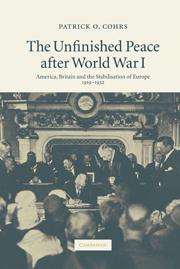Book contents
- Frontmatter
- Contents
- Acknowledgements
- List of abbreviations
- A note on the footnotes and bibliography
- Introduction
- Prologue
- 1 The wider challenges
- 2 Wilson, Lloyd George and the quest for a ‘peace to end all wars’
- 3 The ill-founded peace of 1919
- 4 The escalation of Europe's post-Versailles crisis, 1920–1923
- Part I The Anglo-American stabilisation of Europe, 1923–1924
- Part II Europe's nascent Pax Anglo-Americana, 1924–1925
- Part III The unfinished transatlantic peace order: the system of London and Locarno, 1926–1929
- 17 Sustaining stability, legitimating peaceful change
- 18 Progressive visions and limited commitments
- 19 ‘Reciprocity’?
- 20 The new European concert – and its limits
- 21 Thoiry – the failed quest for a ‘final postwar agreement’
- 22 Towards peaceful change in eastern Europe?
- 23 Achievements and constraints
- 24 No ‘new world order’
- 25 The initiation of the Young process
- 26 The last ‘grand bargain’ after World War I
- Epilogue
- Conclusion
- Map: Post-World War I Europe after the peace settlement of Versailles
- Bibliography
- Index
26 - The last ‘grand bargain’ after World War I
The Hague settlement of 1929 and its aftermath
Published online by Cambridge University Press: 21 July 2009
- Frontmatter
- Contents
- Acknowledgements
- List of abbreviations
- A note on the footnotes and bibliography
- Introduction
- Prologue
- 1 The wider challenges
- 2 Wilson, Lloyd George and the quest for a ‘peace to end all wars’
- 3 The ill-founded peace of 1919
- 4 The escalation of Europe's post-Versailles crisis, 1920–1923
- Part I The Anglo-American stabilisation of Europe, 1923–1924
- Part II Europe's nascent Pax Anglo-Americana, 1924–1925
- Part III The unfinished transatlantic peace order: the system of London and Locarno, 1926–1929
- 17 Sustaining stability, legitimating peaceful change
- 18 Progressive visions and limited commitments
- 19 ‘Reciprocity’?
- 20 The new European concert – and its limits
- 21 Thoiry – the failed quest for a ‘final postwar agreement’
- 22 Towards peaceful change in eastern Europe?
- 23 Achievements and constraints
- 24 No ‘new world order’
- 25 The initiation of the Young process
- 26 The last ‘grand bargain’ after World War I
- Epilogue
- Conclusion
- Map: Post-World War I Europe after the peace settlement of Versailles
- Bibliography
- Index
Summary
In his first annual message to Congress on 3 December 1929, President Hoover remarked that it had been a committee of distinguished experts ‘under American leadership’ that proposed a plan ‘looking to a revision’ of the ex-allied powers' reparations claims against Germany. In his words, his administration had ‘denied itself any participation in the war settlement of general reparations’ as US claims were ‘comparatively small’, arising mainly from ‘the costs of the army of occupation’. Thus, in effect, the calibration of US interest in adopting even an informal role in the process of forging a further, final reparations settlement was distinctly different from what had informed Hughes' policy in 1924. This was underscored by the Hoover administration's original refusal, still maintained in mid-January 1929, to endorse Owen Young as chairman of the expert committee.
Subsequently, Kellogg informed Ambassador Howard ‘in strict confidence’ that while Washington still saw the political responsibility for settling reparations as lying with the European powers, it desired that they should have ‘any advice or assistance’ possible from American experts. Yet he also emphasised that the new US administration desired to leave matters largely ‘in the hands of Mr. Young’, after it had finally approved his chairmanship. As Castle noted, if the European governments ‘got in a jam where they could not organise’, Young would be asked to ‘communicate confidentially with the President’. But there would be no decisive engagement. Once they had commenced, the Hoover administration took care to dissociate itself from the Paris proceedings.
- Type
- Chapter
- Information
- The Unfinished Peace after World War IAmerica, Britain and the Stabilisation of Europe, 1919–1932, pp. 531 - 571Publisher: Cambridge University PressPrint publication year: 2006

